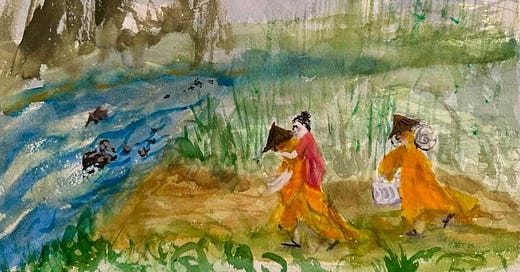Solidarity Over Charity
How To Tell If You Give with Expectations and Strings Attached | How To Learn Not To, Zen Parable
Special thanks for this beautiful Original Art Work by
inspired by this modern take on a Zen classic.Previously published under the title, Two Monks, One Woman, and the River of Life, a Sage Justice original rewriting of a classic Zen parable.
The Story
Two monks were walking toward the rushing river, in the dawn of morning, when they spotted a woman, with a great deal of luggage, trying to figure out how to cross the water without getting wet.
Without communicating with her or breaking their vow of silence, each of the monks moved to either side of the woman and, with a nod to the other, hoisted her upon their shoulders and grabbed her bags and boxes.
The woman complained and carried on the entire time, with “Oh my, careful with my delicate body!” and “Watch out for this! Watch out for that!” and “Don’t drop my precious things or let my beautiful clothing get wet!”
Once they crossed the river, they carefully set the woman and all her belongings down and walked away in silence.
Time passed. It was now dusk; and as the sun began to fall, the younger monk was so angry, offended, and frustrated by the woman that the monk could not stay silent anymore and spoke, “That woman was so rude to us! She didn’t even thank us! Look at us; our robes are still wet and muddy because of her! My back and shoulders still ache from her weight upon them! I have cuts in my hands from the heaviness of her packages digging into my skin, and for what?! We did so much for her, and all she did was complain!”
The Lesson
The older monk took a long deep breath and spoke slowly and in a peaceful tone, so as to be heard over the loud, angry, unregulated emotions of the younger monk. “The woman needed help but did not ask for our assistance. We took the liberty to give it anyway. Our robes are wet and muddy, not because of the woman, but because we chose to walk through the river. There are consequences to giving that belong to the giver, not the receiver. There is no way to walk through water without getting wet; but it cleanses you, even in the process of muddying. If you wanted something in return for what you gave, even gratitude, it was your responsibility to communicate that. We do not attach invisible strings to good deeds we haven’t negotiated, nor do we keep score of what we give and receive.”
The younger monk interrupted and said with angst, “But if we do not expect reciprocity we will be used and taken advantage of.”
The older monk allowed silence to speak next.
This made the younger monk feel heard.
As they focused on their breath and walked softly through the woods, the sounds of nature’s wisdom joined in. Wind moved through the leaves of the trees, birds could be heard singing, and the ever-present hurried hush of the water remained present.
The older monk took in a cleansing breath from nature and spoke the words that closed this dialogue between the two, “Reciprocity comes from the currency of flow. We allow gifts and giving to wash over us like the rushing river, when we least expect it and need it most, like today. Judging and expecting people to behave as you would is a sign that you are expecting something from others that needs to come to you, from you. If your body still hurts, use empathy and imagine what hers must feel like to carry all that emotional baggage everywhere she goes. Shift your focus to gratitude for what you gained from this experience, not what you lost in giving it. In truth, we gave more to ourselves than we gave to her, for in helping her, we were reminded of the wealth in our simplicity, that ‘some people are so poor, all they have is money.’ *
The Takeaway
The monk continued, People who are clearly in need of help should not have to ask for it in order to receive it. Forcing people to see themselves as charity when we have the ability to act in solidarity and treat them as equals, can cause more humiliation than humility. We saw a need, and we were able to help. She did not ask us for our help, we offered, and that is an important distinction in considering judgment against her and expectation from her. We gave ourselves the gift of gratitude with the awareness that, in our minimalism, we do not carry her burdens; let that be all the thanks we need. Learn to let go of unmet expectations that were never expressed, agreed upon, or negotiated. ‘I set the woman down long ago. Why are you still carrying her?’**”
Solidarity Over Charity
Inspiration for this piece:
“Train yourself toward solidarity and not charity. You are no one’s savior. You are a mutual partner in the pursuit of freedom.” -Brittany Packett
“I don't believe in charity. I believe in solidarity. Charity is so vertical it’s humiliating. It goes from the top to the bottom. Solidarity is horizontal. It respects the other and learns from the other.” - Eduardo Galeano
Closing Note
The expression, “I’ve done so much for them/him/her/you” is code for: “I expect others to do something for me that I didn’t make clear to begin with.” For example, “If I do thoughtful or generous acts of kindness for another, I expect them to not call me out on my BS, even when I deserve it.” This is an illustration of “Golden Handcuffs:” having our voices silenced in exchange for receiving gifts. This is not gratitude, this is servitude.
It’s completely justified to expect something in return for what we give, if we make that clear from the beginning and give the receiver a choice in agreeing or disagreeing with those terms. However, true generosity gives because it can and receives when is necessary. No matter how much we choose to believe otherwise, we are in fact one. For every act of generosity we give to another, there will come a time when we too are in need of receiving. We may not be able to see it in the prime of our health or income earning ages, but each of us is a candidate for becoming disabled at any given time. Health is not a a guarantee to anyone.
There will come a time in every person’s life when they are dependent on some form of kindness and compassion from another. A loss in dignity can be the birth of humility. The sooner we can see ourselves as the recipient, or the giver— not of charity, but of solidarity, the sooner we can learn to give without strings attached or expectation of reciprocity (from the specific person or entity we give to). Sometimes reciprocity comes from someone unexpected who we may not even know; but who is simply paying forward what they were once given, like an errant ball landing in our laps, until we toss it to another.
When taking into consideration the lofty concept of “The invisible hand” (Adam Smith, Wealth of a Nation), so too, we must remember that, “We live in a world where not everyone begins on the same starting line. Therefore, wealth is often a higher income than we deserve for opportunities we are lucky enough to have.”*** This leaves us with the understanding that mutual aid is not charity but rather the solidarity social net we weave that comes from individuals carrying for other individuals, who could be in their shoes if not for the luck of the draw.
Watch the philosophical hijinks of Trading Places to be reminded that even the privilege of entitlement can be taken away without notice. It’s not enough to be grateful for what we have, we must also be grateful for what we are able to give.
©Sage Justice March, 2025. This is a Sage Justice original rewriting of a classic Zen parable. If you use it, please give credit and link to original work. Thank you.
Footnotes
* Quote attributed to Bob Marley
** Original line from the Zen parable
***Sage Words FREEDOM Book One
Sage Justice at Joshua Tree, California, March 10, 2025
Sage Justice is an award-winning poet, author, critically acclaimed performing artist, and intensely sincere, bold humanitarian activist.1
If you appreciate this publication, Sage Words, but are unable to afford a subscription, please consider choosing the “Buy me a coffee” button when you can. Every little sip helps. Thanks.






This is incredible! Even though I learned small pieces of this lesson years ago, your expansion of the concept is crafted so beautifully, and in an easily digestible manner. To me anyway.
I appreciate this essay so much. Thank you!
Also, Love this quote: “Train yourself toward solidarity and not charity. You are no one’s savior. You are a mutual partner in the pursuit of freedom.” -Brittany Packett
The vertical (charity) vs the horizontal (solidarity). Nourishing food for the mind and soul. Something to really contemplate. Thank you for this deep share.